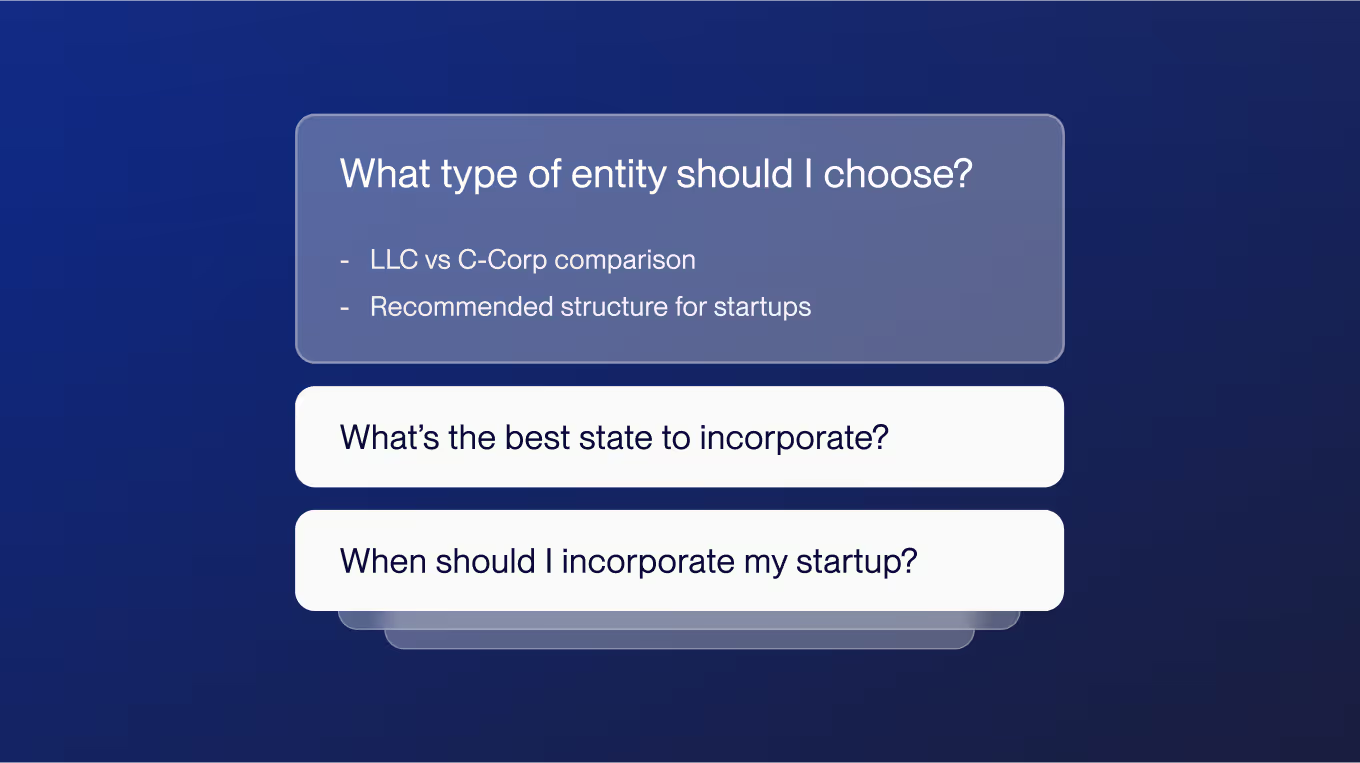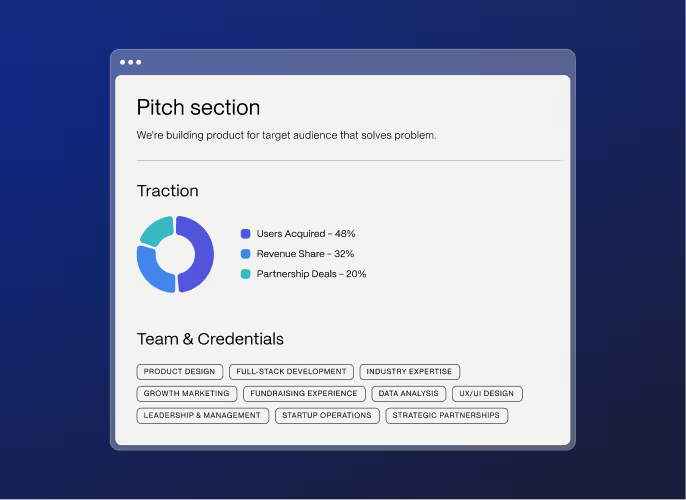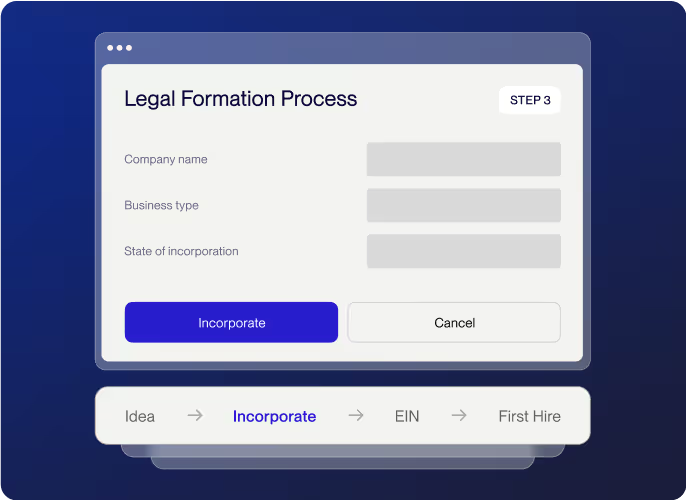When is the right time to incorporate?
The ideal time to incorporate is when you have either secured an investor committed to funding your venture or obtained your first customer contract requiring a legal entity. Incorporating too early means unnecessary expenses when cash conservation is crucial.
Why should I choose a Delaware C Corporation?
Delaware C Corporations are preferred because they:
- Meet investor preferences (most VCs and angels require this structure)
- Allow flexible ownership structure with different stock classes
- Benefit from Delaware's business-friendly corporate law system
- Support scalability for multiple funding rounds and eventually an IPO
- Enjoy national recognition across all states
- Provide favorable tax treatment for investors
What should I do before incorporating?
Two critical steps before incorporating:
- Ensure you're ready to take on the financial obligations (taxes and filing fees)
- Leave your current job to avoid intellectual property conflicts with your employer
How should I structure my founder shares?
Consider including a "double trigger acceleration clause" in your vesting agreement. This protects your equity if your company is acquired and you're terminated, by accelerating your vesting schedule. Most investors accept this founder-friendly provision.
What are the basic steps of incorporation?
- Filing of the Certificate of Incorporation with the Delaware Secretary of State
- Action of Incorporator appointing the initial board of directors
- Board resolutions regarding initial corporate maintenance matters
- Issuance of stock to founders
- Assignment of intellectual property by founders
- Stockholder resolutions regarding initial corporate maintenance matters
- Creation of Stock Plan (optional at formation, but will need to be created before issuing equity to service providers)
Why incorporate at all?
Incorporation provides three key benefits:
- Limited liability protection for founders and stockholders
- Formal structure for contracts and employment relationships
- Access to venture capital investment
Do I need a lawyer to incorporate?
No, you don't need a lawyer to incorporate unless you have complex situations, like you're flipping an LLC or have a foreign entity. Many founders use online incorporation services or self-file directly with Delaware. For straightforward incorporations, the process is standardized enough that you can handle it yourself. Just be sure to carefully follow the required steps and complete all necessary filings. That said, consulting with a lawyer for a quick review of your final documents can be a worthwhile investment to catch any issues.
What is a typical vesting schedule for founders?
A standard vesting schedule for founders is 4 years with a 1-year cliff. This means after 1 year, 25% of your shares vest, and then the remaining 75% vest monthly over the next 3 years.
Hot take: Some savvy founders are increasing to 6-year vesting schedules. This allows you to give 50% larger equity grants when you hire people, while in the end reducing dilution because most employees won't stay the full 6 years. Since unvested shares return to the company when someone leaves, this approach gives the appearance of generosity while actually preserving more equity for the company and remaining shareholders over time. It's particularly effective for companies anticipating longer runways between funding rounds.
What are the tax implications of forming a C Corporation?
C Corporations are subject to "double taxation" - the corporation pays taxes on its profits, and shareholders pay taxes on dividends. However, early-stage startups typically operate at a loss, so this is rarely an immediate concern.
What is founders preferred stock?
Founders preferred stock was historically needed to be able to sell your shares on the secondary market. However, this is no longer necessary. In modern funding rounds, your common stock gets converted to preferred stock and sold to investors at the time of your fundraise. This simplifies the process and provides the same liquidity benefits without requiring a separate class of stock for founders.
Can I incorporate if I have international co-founders?
Yes, international co-founders can be part of a Delaware C Corporation. However, international founders may face additional complexities regarding taxation and visa requirements that should be addressed with specialized legal counsel.
What's the difference between authorized and issued shares?
Authorized shares are the maximum number of shares your company can issue as stated in your Certificate of Incorporation. Issued shares are the portion of authorized shares actually distributed to shareholders. It's common to authorize many more shares than you initially issue.
How much does it cost to incorporate in Delaware?
The basic filing fee is modest (typically under $100), but the total cost including registered agent fees, franchise taxes, and legal fees can range from several hundred to several thousand dollars depending on complexity and whether you use legal assistance. If you use Every.io, you can incorporate for free.
How should we assign officer titles?
Don't worry too much about who gets the roles of CEO/president and secretary. These are required by Delaware law but won't significantly impact the day-to-day running of your company and can be changed later. To keep things simple, many startups have the CEO occupy all these officer roles, especially in the early stages. One person can legally hold multiple officer roles (or even all officer roles in the case of a solo founder).
Who should be on the board of directors?
Typically, at formation, only founders should be on the board. It's generally not in your interest to add third parties like friends or advisors, given the board's important role in controlling the company. If there are experts whose opinions you value, consider bringing them on as advisors instead.
What is the board's role vs. stockholders?
The board has exclusive ability to remove company officers, including the CEO. Board approval is necessary for almost all major company actions, including equity issuances, amendment of the certificate of incorporation, financing agreements, and acquisitions. Stockholders usually hold blocks on certain company actions (like an acquisition or secondary sale) but their voting rights are otherwise more limited, particularly in early-stage companies.
How can we avoid "founder deadlock" with two equal co-founders?
For startups with two founders who have equal shares and board seats, deadlocks can occur when founders disagree. To avoid this, consider either: (1) having one founder (usually the CEO) hold at least one more share than the other, or (2) having only one founder on the board. Addressing this upfront can save the company from potentially fatal disagreements later.
What size should our stock plan/option pool be?
Set the stock plan (also called employee option pool or equity incentive plan) to the amount of shares you'll actually need for hiring between seed and Series A. This typically ranges around 10%, but some startups set a lower number while others may need more depending on hiring plans. Note that you don't need to actually create the stock plan until you hire your first non-founding employee.
When should I start thinking about trademark protection?
It's advisable to protect trademarks (brand, logo, company name) early on, though it can cost a few thousand dollars. If you're very early stage and bootstrapped with no users, it might not make immediate sense. The risk of not filing is that someone could secure protection for your name before you do, forcing you to change names or enter an expensive dispute. International protection may be particularly important in jurisdictions where trademark squatting is common.
How long does it take to get my EIN?
If you have a Social Security Number (SSN), you can typically receive your Employer Identification Number (EIN) within a day by applying online through the IRS website. However, if you don't have an SSN (common for international founders), the process can take 4-6 weeks as you'll need to apply by mail or fax using Form SS-4.
What is an 83(b) election and why is it important?
An 83(b) election is a tax filing that allows founders and early employees to pay taxes on the total fair market value of their equity at the time of grant, rather than at each vesting milestone. This is crucial because:
- It starts your capital gains holding period immediately
- You pay taxes on a much lower valuation (when shares are worth very little)
- You avoid paying higher taxes later as your company grows in value
You must file the 83(b) election with the IRS within 30 days of receiving your stock grant - this deadline is strict and non-negotiable. Missing this filing can result in a significantly higher tax burden as your company increases in value. Most founders consider this an essential step when receiving equity subject to vesting.
{{get-started-banner}}
What is QSBS and how does it help me save on taxes?
QSBS (Qualified Small Business Stock) is a special tax benefit under Section 1202 of the Internal Revenue Code that can potentially allow founders and early investors to exclude up to 100% of capital gains from federal taxes when selling their shares.
To qualify for QSBS treatment:
- Your company must be a C Corporation (another reason Delaware C-Corps are preferred)
- You must have acquired the stock at original issuance (not on secondary market)
- The company's gross assets must be under $50 million when you acquired the stock
- You must hold the shares for at least 5 years
- The company must be engaged in a qualifying active business (most tech startups qualify)
QSBS can provide enormous tax savings - potentially eliminating federal capital gains taxes on up to $10 million in gains or 10 times your investment basis, whichever is greater. This is a significant advantage of incorporating as a C-Corp versus alternatives like an LLC. To maximize QSBS benefits, proper documentation from the beginning of your company's life is essential.













